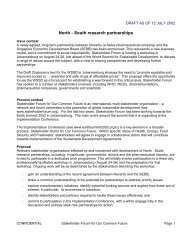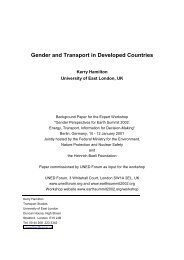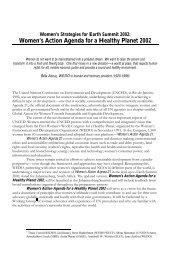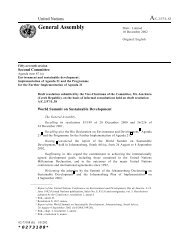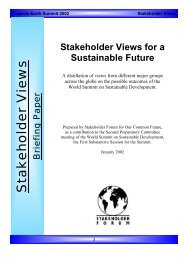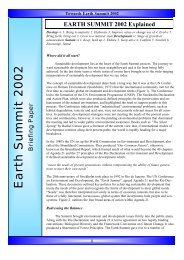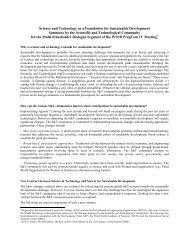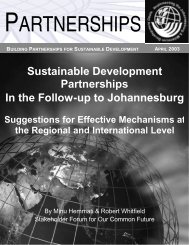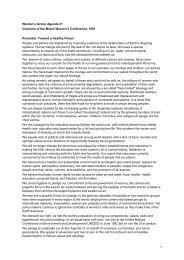Capacity Building for Partnerships - Earth Summit 2002
Capacity Building for Partnerships - Earth Summit 2002
Capacity Building for Partnerships - Earth Summit 2002
Create successful ePaper yourself
Turn your PDF publications into a flip-book with our unique Google optimized e-Paper software.
GOALS<strong>Capacity</strong> building <strong>for</strong> sustainable development partnerships aims to contribute to the achievement of the following goals:• Enable all stakeholders to successfully initiate, design and implement partnerships <strong>for</strong> sustainable development;• Enable all stakeholders to effectively monitor and evaluate their partnership ef<strong>for</strong>ts, and learn from their experiences;• Enable all stakeholders to effectively feed their experience and expertise into policy making;• Strengthen the stakeholder community as a whole and those engaged in partnerships by increasing professionalism andeffectiveness; and• Enable "trained" stakeholders to carry out similar capacity building programmes among their constituencies.through:• <strong>Building</strong> necessary background knowledge of sustainable development and relevant decision-making processes at theinternational, regional, sub-regional, national and local levels;• Addressing the intellectual, practical and personal challenges of a partnership approach to sustainable development;• Learning about tools and techniques <strong>for</strong> designing and implementing partnerships; and• Learning about the processes used to design, implement and evaluate the capacity-building programme itself.Looking at the knowledge and skills that help to create successful multi-stakeholder partnerships leads to defining the followingcomponents <strong>for</strong> capacity building programmes:CONTENTSustainable developmentRationale: The concept of sustainable development is complex and so are the political, social and economic processes related to itsrealisation. Potential partners should have a solid knowledge of the concept, its three pillars, it's analytical differentiation intosectoral and cross-sectoral issues and the importance of good governance and enabling environments.<strong>Partnerships</strong> <strong>for</strong> sustainable development should aim to contribute to the implementation of sustainable development agreements, themost prominent recent ones being the Millennium Development Goals and the goals and targets set at the Johannesburg <strong>Summit</strong>. Inorder to do that, potential partners need to be well aware of the priorities set in those agreements and the continuing policy andreview processes relating to them, at the various levels. Potential partners also need to gain an understanding of existing and plannedimplementation programmes as well as partnerships – and how to get that in<strong>for</strong>mation - so as to be able to identify the specificcontribution any potential partnership can make.Components:• Sustainable development and its components: environmental, social and economic pillars and their inter-linkages• Good governance and sustainable development; the multi-stakeholder approach and questions of democracy (legitimacy;participation);• Knowledge about the relevant international agreements, primarily the Millennium Development Go als (MDGs) and theJohannesburg Plan of Implementation;• Knowledge about relevant institutions and processes that operate in support of partnerships <strong>for</strong> sustainable development, eg UNand other bodies;• The international, regional and national political roadmaps <strong>for</strong> the next five years with a particular focus on the MillenniumDevelopment Goals and implementation of the Johannesburg outcomes; and• Existing implementation programmes and partnerships <strong>for</strong> sustainable development. Scoping what is going on will enable theprospective partners to identify their possible contribution as well as necessary linkages and potential additional partners;Stakeholders and multi-stakeholder collaborative actionRationale: It has been agreed that sustainable development, although established as an overarching concept in intergovernmentalprocesses, is not something that governments and agencies can achieve on their own. It takes the contribution of all stakeholders andtheir individual and collective actions to bring about the changes required. Innovative solutions to complex problems can be createdSTAKEHOLDER FORUM • APRIL 2003 3



